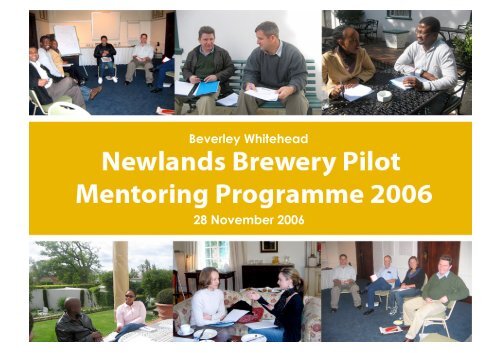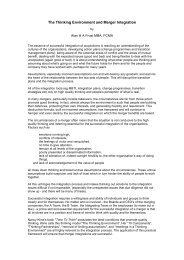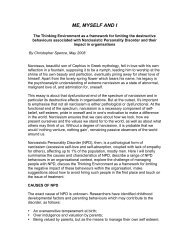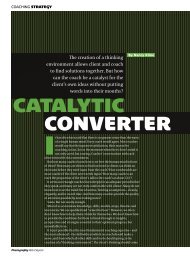Beverly Whitehead; South African Breweries Pilot - Time To Think
Beverly Whitehead; South African Breweries Pilot - Time To Think
Beverly Whitehead; South African Breweries Pilot - Time To Think
- No tags were found...
You also want an ePaper? Increase the reach of your titles
YUMPU automatically turns print PDFs into web optimized ePapers that Google loves.
Beverley <strong>Whitehead</strong>28 November 2006
How do we see Mentoring?Off-line help by one person to anotherin making a significant transition in knowledge work andthinking.(Clutterbuck, 1990)Within Newlands Brewery, as part of a formal mentoringprogrammeInspiring us towards fulfilling our potentialNewlands Brewery <strong>Pilot</strong> Mentoring Programme 2006
What is the nature of our mentoringprogramme?• 16 mentoring pairs introduced in groups of 4 pairs over 7 months• Mentee-directed• Skills offered to to both parties (mutually beneficial)• Holistic approach to individual’s personal growth and careerissues• Relationship components, inner-being and contextual issuesinteract to produce mentoring outcomes• <strong>Think</strong>ing will flourish and solutions will be found in the presenceof questions and an attentive other• Not administratively intensive – quality relationships• Qualitative rather than quantitative emphasisNewlands Brewery <strong>Pilot</strong> Mentoring Programme 2006
How is our programme structured?MenteeClosureSkills and PracticeContractingEngagementProgramme FacilitatorIndividual PreparationMentorManager as CoachNewlands Brewery <strong>Pilot</strong> Mentoring Programme 2006
How did we gear up formentoring?• Individual preparation (self-reflection and interview)• Four days of training, contracting and practicea) Appreciative Mentoring/ Immersion in Mentoring(1 day)b) <strong>Think</strong>ing Environment training (2 days)c) +/- 3 self initiated mentoring sessions in pairsd) <strong>Think</strong>ing Environment review, reflection & otherapplications (1day)• Formal reviewNewlands Brewery <strong>Pilot</strong> Mentoring Programme 2006
What is the <strong>Think</strong>ing Environment?(NANCY KLINE)• Positive philosophy of human nature• People can think for themselves and solve their own problems ifthey are allowed to think!• People think well together (thinking partners)• Everything we do depends on the quality of the thinking we do first• The mind thinks best in the presence of a powerful question• A set of conditions, the ‘Ten Components’ (e.g. attention, equality,ease, appreciation …), used as a system, facilitates transformativethinking• The thinking partnership encourages active listening and ‘FreeExploration’ (without interruption) to facilitate thinking• Incisive Questions are formulated to help the thinker to removelimiting assumptionsNewlands Brewery <strong>Pilot</strong> Mentoring Programme 2006
How do you mentor in a<strong>Think</strong>ing Environment ?• Incorporate the ‘Ten Components’• Provide transferable skill to both parties• Promote equality• Structure the mentoring session (mentee think, interview,mentor think, appreciation and close)• Develop the mentee’s independent thinking• Provide mentee with benefit of mentor’s experiencewithout giving adviceNewlands Brewery <strong>Pilot</strong> Mentoring Programme 2006
<strong>Think</strong>ing Environment Mentoring Session Newlands Brewery <strong>Pilot</strong> Mentoring Programme 2006
What were the high levelfindings?• Overall, positive experience:1) Eye opening2) Unique relationship3) Practical4) Enjoyable5) Powerful6) 1 st good mentoring experience7) Mutually beneficialNewlands Brewery <strong>Pilot</strong> Mentoring Programme 2006
What insights do we have into ourmentees’ experiences?• Structure mostly welcomed• Equality appreciated• Contributing to process valued• Speaking freely and confronting issues previously avoided• Quality time and developing trusting relationship in workenvironment (lacking); caring; friendship• Sessions fortnightly – monthly• Independent thinking and problem solving• Increased confidence and self-worth• Understanding bigger picture• Applying active listening in many other interactionsNewlands Brewery <strong>Pilot</strong> Mentoring Programme 2006
What insights do we have into ourmentors’ experiences?• Mentors don’t need to have all the answers; ownership bymentee; minimises nervousness of mentor• Reciprocal thinking process; both benefit; empowerment;personal growth• Slowing down to think and listen better• Significant time investment• More beneficial than expected• Confidentiality and disclosure in small community can bedifficult in relation to business discussions• Quiet individuals are more affirmed• Identified synergies to our leadership brand, leadershipessentials and PBS processNewlands Brewery <strong>Pilot</strong> Mentoring Programme 2006
What difficulties wereexperienced?• Allocating time and coordinating schedules;work pressure; absence (managed fortnightly tomonthly sessions)• Formulating incisive questions (comes withpractice)Newlands Brewery <strong>Pilot</strong> Mentoring Programme 2006
What were my ownassumptions?• Counter-culture• Pace too slow• May be rejected• Structure would be welcome• Skills would be valuedNewlands Brewery <strong>Pilot</strong> Mentoring Programme 2006
What have I learnt?• Respite from usual pace was welcomed (albeit heresy)• In general, mentees liked 4-days of training; mentorswould prefer a 2-day process• TE sets tone and benchmark• Ten components form the cornerstone• Structure useful• Skills are transferable into other contexts• Process has impacted on how we are in relationshipwith one another, beyond the mentoring relationship(balancing voices)Newlands Brewery <strong>Pilot</strong> Mentoring Programme 2006
How have mentees’ goalsguided the sessions?• Guided most discussionsE.g. Recent Job change/transitionE.g. Clarifying career goals;E.g. Exploration of “my next option”E.g. Exploration of “what is possible for me”• Mixture personal growth and work-relatedissuesNewlands Brewery <strong>Pilot</strong> Mentoring Programme 2006
How healthy are ourmentoring pairs?• Very nearly all were happy or very happy withchoice of mentor or mentee• All are actively mentoring at present• One pair considering closure• All experienced transfer of skills and derivedpersonal benefit from the mentoring sessions• One pair not surveyedNewlands Brewery <strong>Pilot</strong> Mentoring Programme 2006
So where did we meet?• Generally Off-site• Uninterrupted place e.g. quiet restaurant, pub oroutside space• Mentor’s office – got one mentionNewlands Brewery <strong>Pilot</strong> Mentoring Programme 2006
Any recommendations for afurther Newlands rollout?• Mentors: YES. Focus on few healthy relationships 16 pairs; more pairs; high potentials Expose as many as possible to TE• Mentees: YES. Especially trainees in transition Provide TE tools (for all) then mentoring & pairing (forsome) Levels OE+Newlands Brewery <strong>Pilot</strong> Mentoring Programme 2006
What thoughts aboutdivisional applicability?• Good support for divisional application Good linkage with leadership brand• Some concerns expressed about approach Need to measure effectiveness to entrench it intothe SAB way, yet this may compromise on essenceof programme and not achieve benefits (shouldwant to … vs have to!) Should not be introduced as a ‘divisional race’Newlands Brewery <strong>Pilot</strong> Mentoring Programme 2006
What other recommendationssurfaced?• Streamline future training process – perhaps to include 2-day TEtraining and 2-day mentoring (intro & contracting & TE application)• Further clarification of mentor & manager-coach roles• Contracting specifically with manager-coach• Evolve how to work flexibly with TE stages• 6-monthly forum: TE ‘top up’, reviews for mentoring pairs with timefor mentors and mentees to meet separately• Capture mentoring session on SAP as personal / professionaldevelopment• Monitor health and vitality of mentoring relationships throughregional coordinator of programmeNewlands Brewery <strong>Pilot</strong> Mentoring Programme 2006
What would the businessoutcomes be if all menteeswere mentored in this way?• Respect for one another• Well-developed interpersonal skills• Sharing of knowledge and experience• Generating good thinking, ideas and innovation• Solving work problems• Resolving inner conflicts relating to self or careerNewlands Brewery <strong>Pilot</strong> Mentoring Programme 2006





